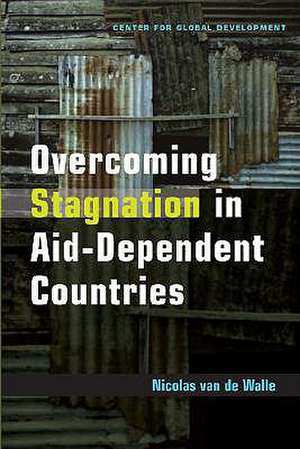Overcoming Stagnation in Aid-Dependent Countries
Autor Nicolas Van De Walleen Limba Engleză Paperback – 25 mar 2005
In this book, Nicolas Van de Walle identifies 26 countries that are extremely poor and grew little if at all in the 1990s. His sample excludes North Korea and countries where civil war explains some of their failure to grow (Afghanistan, Sierra Leone, Sudan, Tajikistan and others). The 26 countries have limited infrastructure and human capital and the small size of their markets deter private savings and investment. Aid was meant to help overcome these problems, and these countries received a lot. Yet they have failed to grow. What is wrong? Is foreign aid a solution or part of the problem? What changes might make aid more effective? Given these countries require the financial and technical resources of the West, why haven't aid programs made a difference? Van de Walle blames their economic failure mostly on the venality and incompetence of their political leadership. He analyzes the contradictions and tensions faced by the aid community in poorly run countries, providing a sobering analysis of the perverse effects of aid where the politics is all wrong. Too often, resources provided by foreign aid keep the wrong government in office, and undermine adoption of economic as well as political reforms. Bad government combined with aid, in short, hurts poor countries – and particularly the poorest people in those countries. Despite good intentions, little progress has been made in implementing announced "reforms" of the aid business itself. A constituency for reform is lacking, in the donor countries and in the recipient countries, where those in power benefit from the status quo.
Preț: 103.33 lei
Preț vechi: 152.42 lei
-32% Nou
Puncte Express: 155
Preț estimativ în valută:
19.79€ • 20.19$ • 16.65£
19.79€ • 20.19$ • 16.65£
Carte indisponibilă temporar
Doresc să fiu notificat când acest titlu va fi disponibil:
Se trimite...
Preluare comenzi: 021 569.72.76
Specificații
ISBN-13: 9781933286013
ISBN-10: 1933286016
Pagini: 120
Dimensiuni: 152 x 229 x 7 mm
Greutate: 0.2 kg
Editura: Brookings Institution Press
Colecția Center for Global Development
Locul publicării:United States
ISBN-10: 1933286016
Pagini: 120
Dimensiuni: 152 x 229 x 7 mm
Greutate: 0.2 kg
Editura: Brookings Institution Press
Colecția Center for Global Development
Locul publicării:United States
Notă biografică
Nicolas van de Walle is the John S. Knight Professor of International Studies and the Director of the Mario Einaudi Center for International Studies at Cornell University, and a Non-Resident Fellow at the Center for Global Development. He has p
Descriere
In this book, Nicolas Van de Walle identifies 26 countries that are extremely poor and grew little if at all in the 1990s. His sample excludes North Korea and countries where civil war explains some of their failure to grow (Afghanistan, Sierra Leone, Sudan, Tajikistan and others). The 26 countries have limited infrastructure and human capital and the small size of their markets deter private savings and investment. Aid was meant to help overcome these problems, and these countries received a lot. Yet they have failed to grow. What is wrong? Is foreign aid a solution or part of the problem? What changes might make aid more effective? Given these countries require the financial and technical resources of the West, why haven't aid programs made a difference? Van de Walle blames their economic failure mostly on the venality and incompetence of their political leadership. He analyzes the contradictions and tensions faced by the aid community in poorly run countries, providing a sobering analysis of the perverse effects of aid where the politics is all wrong. Too often, resources provided by foreign aid keep the wrong government in office, and undermine adoption of economic as well as political reforms. Bad government combined with aid, in short, hurts poor countries – and particularly the poorest people in those countries. Despite good intentions, little progress has been made in implementing announced "reforms" of the aid business itself. A constituency for reform is lacking, in the donor countries and in the recipient countries, where those in power benefit from the status quo.
